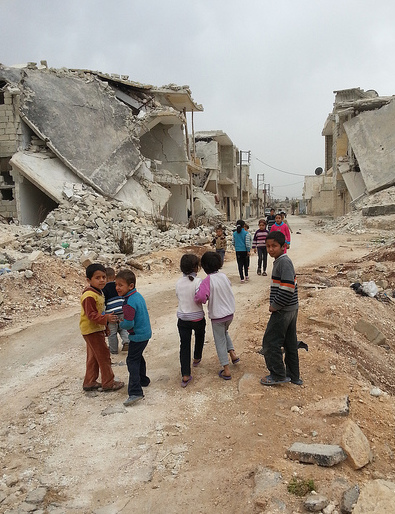Today in New York, states are meeting to discuss how the international community should respond to the harm to civilians caused by the use of explosive weapons in populated areas, at a conference convened by the governments of Austria, Chile, Costa Rica, Mexico, and Mozambique.
Over the past several years, this issue has been identified as a top priority for states concerned with the protection of civilians in armed conflict. The UN Secretary-General has repeatedly called on states to refrain from using explosive weapons with wide area effects in populated areas, and to engage constructively in efforts towards developing a political response. Around 70 states have now spoken up in public forums to recognize the harm resulting from the use of explosive weapons in populated areas, including some that have called for international political action to address this harm.
Discussions are starting towards developing a political instrument to address this humanitarian problem, and to set a political and operational direction against the use in populated areas of those explosive weapons that expose civilians to the gravest risks.

Children in Azaz, Aleppo governorate in Syria (© IHH Humanitarian Relief Fondation https://flic.kr/p/mC9de1)
The main response to this humanitarian problem that will be under consideration today is a political declaration on the prevention of civilians harm from the use of explosive weapons in populated areas. Such a declaration, containing concrete commitments for states as well as a recognition of this issue, would represent a first step towards addressing the devastation to civilians, their homes and communities caused by bombing and bombardment in populated areas in conflicts worldwide. The countries present at today’s meeting will exchange views on what the elements of a political declaration on explosive weapons must be.
INEW has issued a briefing paper discussing they key elements that such a political declaration should contain.
The development of an international political declaration must promote actions that will reduce humanitarian harm from the use of explosive weapons in populated areas, and increase the protection of civilians living through conflict.
A political declaration signed by a group of states must be seen not as a stand-alone document, but as a tool that promotes operational policy and practice better to protect civilians, and as a framework for states to work together to achieve that purpose.
We recommend that a declaration should contain:
- A clear recognition of the humanitarian problem that it works to address, which should entail a description of the different impacts from death and injury to the destruction of infrastructure and displacement;
- Commitments to action, including a commitment to stop the use of explosive weapons with wide area effects in populated areas. This should be central to a declaration and would provide the best practical mechanism for reducing civilian harm;
- Commitments to assist the victims of explosive weapons, providing a framework for promoting efforts to ensure that the victims of armed conflict are supported towards the full realisation of their rights and for the provision of assistance to individuals and affected communities;
- Commitments to gather and share data on the impact of explosive weapons;
- Commitments to humanitarian and protection measures; and
- A commitment to ongoing action on this issue, with the declaration providing a framework for further discussions amongst states, international organisations and civil society.
Read our briefing, ‘A declaration to prevent harm from the use of explosive weapons in populated areas.’
